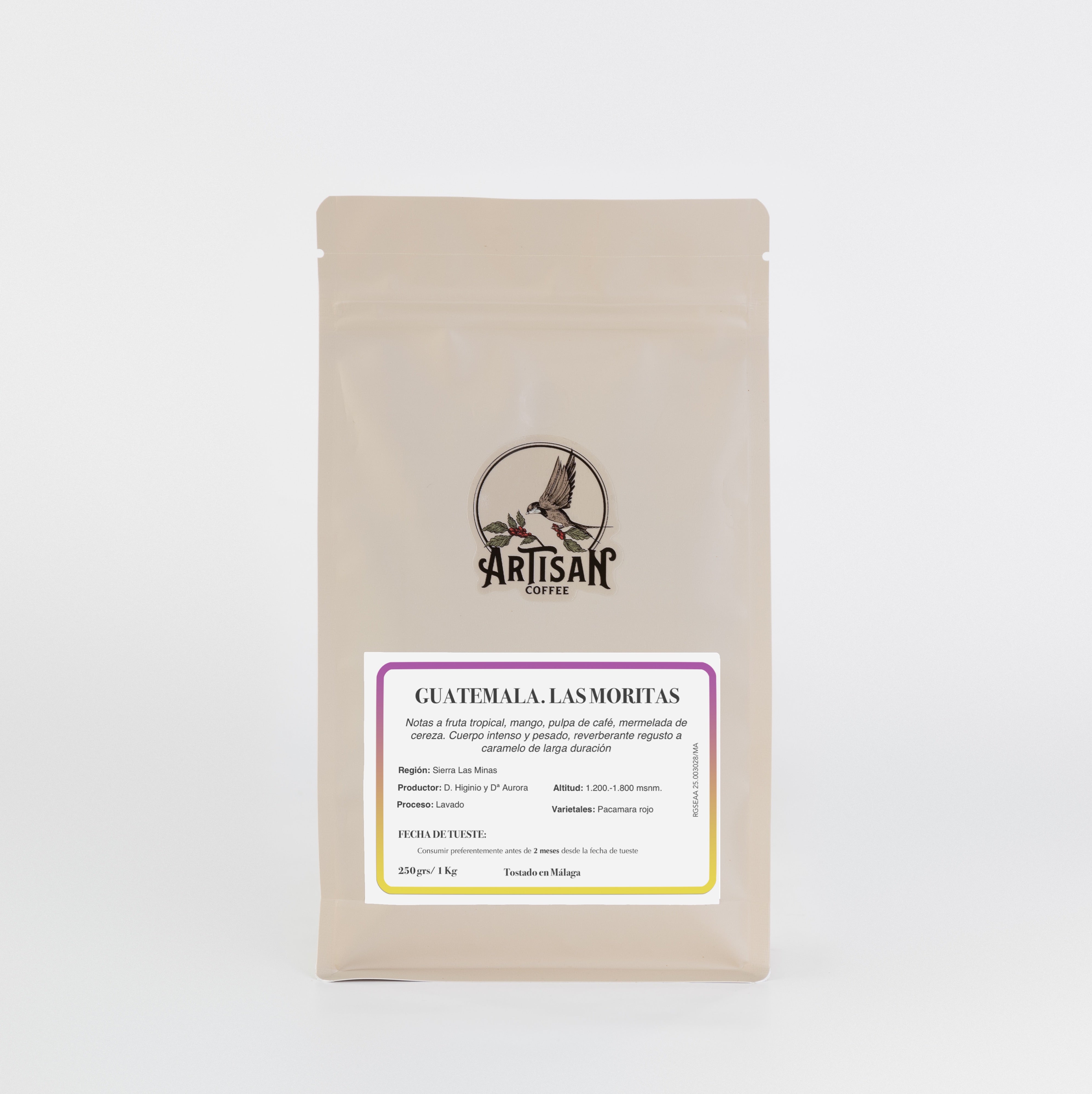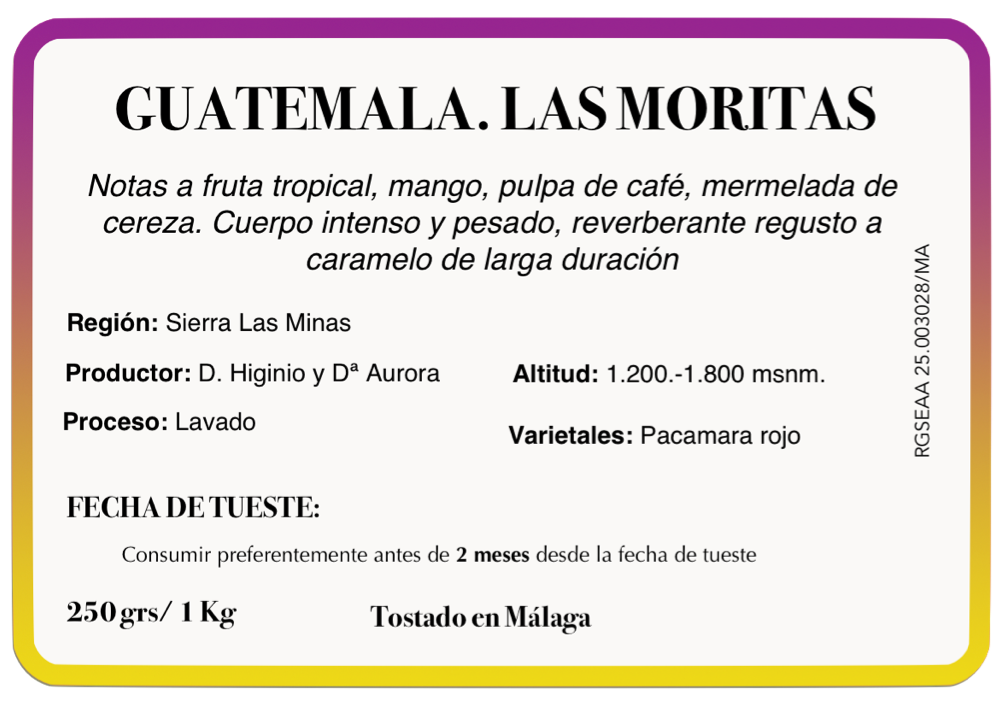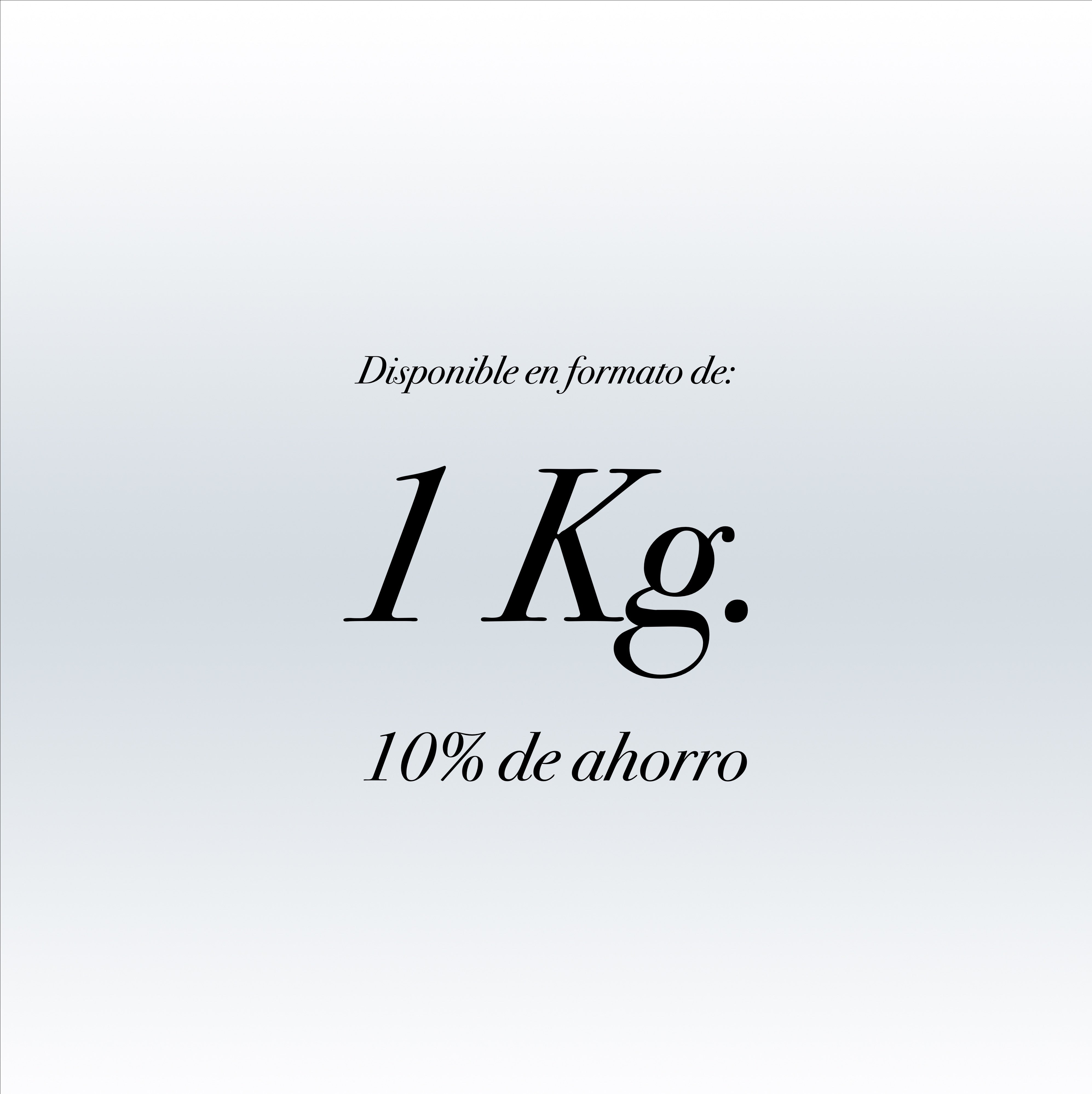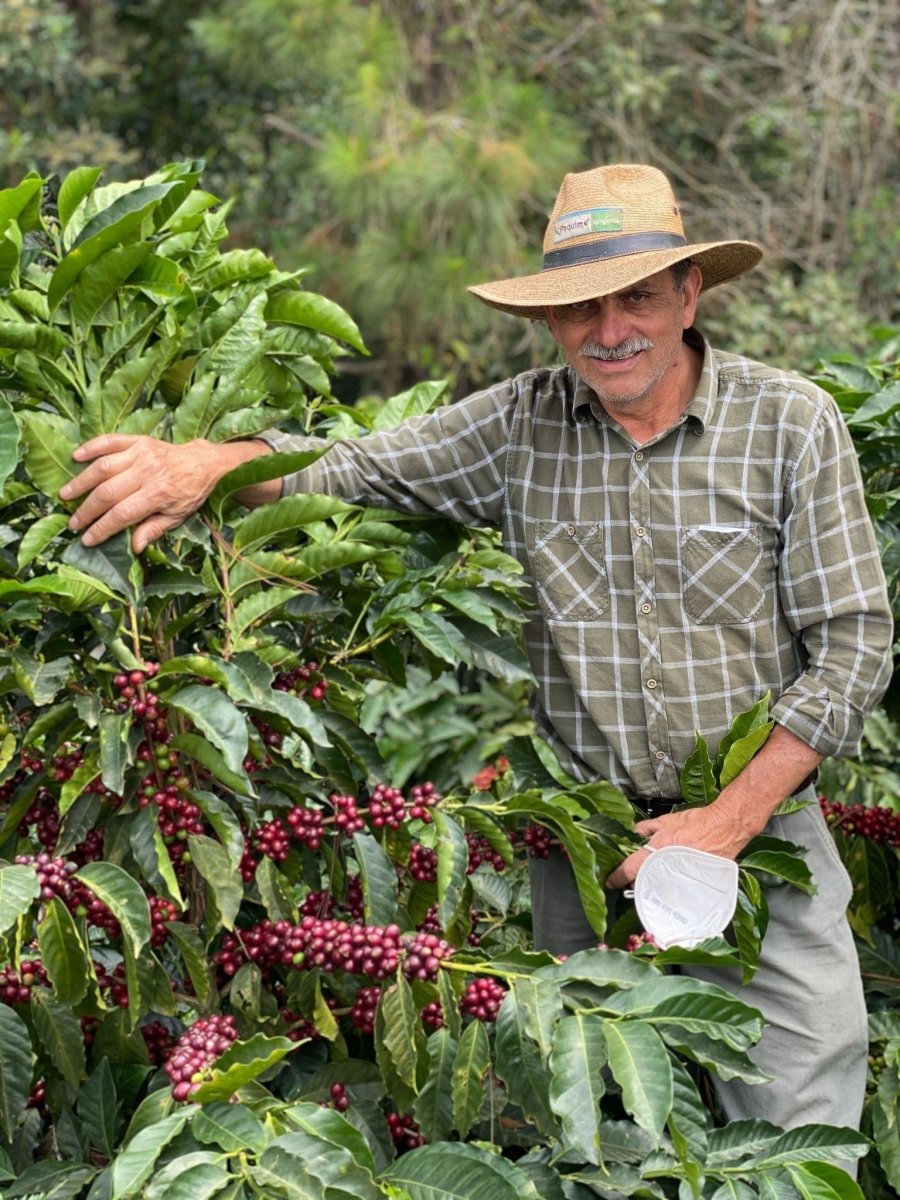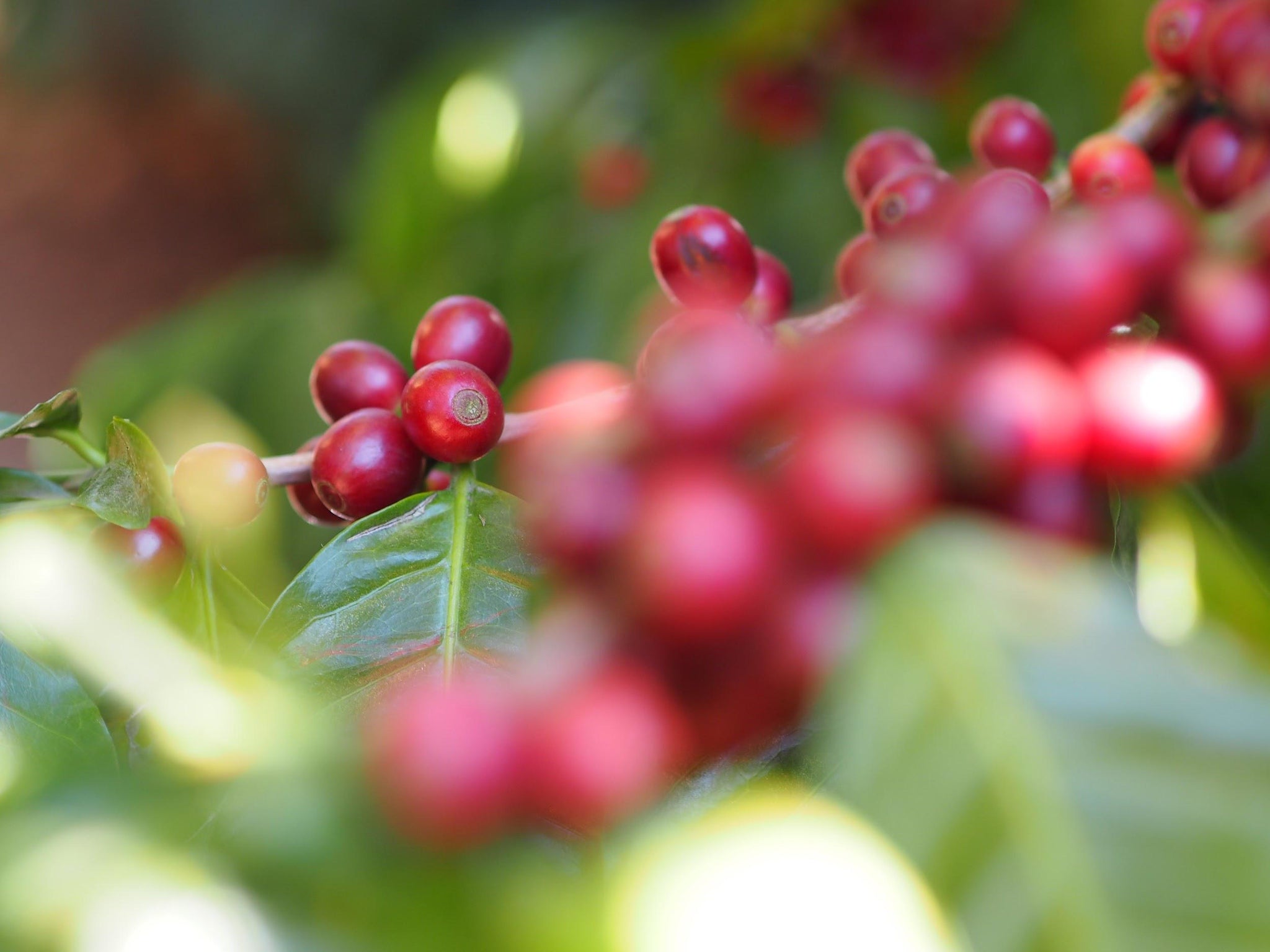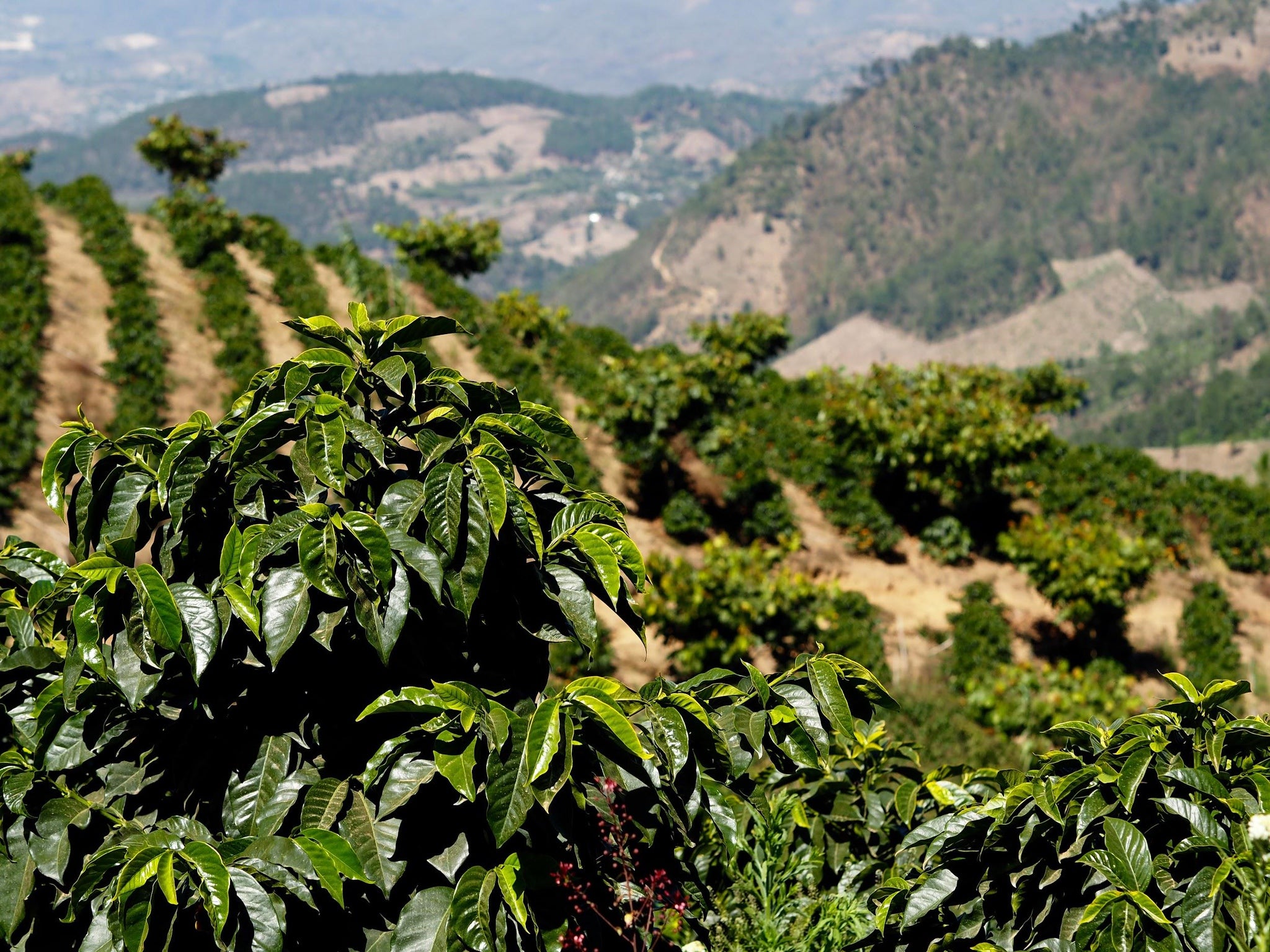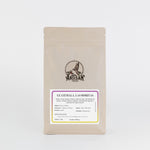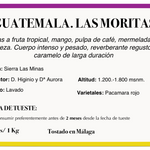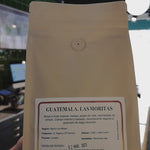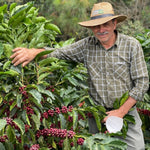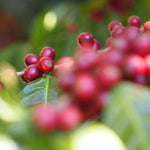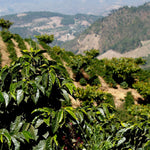The Moritas. Guatemalan coffee. red pacamara
Description
Sensory Profile: Tropical fruit, mango, coffee pulp, cherry jam. Intense and heavy body with long-lasting reverberant caramel taste
Origin: Guatemala
Producer: Mr. Higinio and Mrs. dawn
Region: Sierra Las Minas
Altitude: 1,200 - 1,800 meters above sea level
Estate: Las Moritas
Process: Washing
Varietal: Red Pacamara
Las Moritas Estate. Don Higinio and Doña Aurora
The Las Moritas farm is located at 1,200-1,800 meters above sea level in the department of El Progreso in the Sierras de Las Minas region in Guatemala.
Las Moritas has 70 hectares of land, with 56 hectares dedicated to coffee, mainly the Bourbon, Caturra, Pacamara and Castillo varieties, which are grown under shade trees.
Cultivated land covers various types of terrain, soils and climates, making growing conditions diverse.
The farm is owned by Don Higinio and his wife Doña Aurora , who bought their first land back in 1988, calling it San José Las Moritas.
Las Moritas was the first of many properties that Don Higinio has acquired over the years. He started with less than a hectare of land, and the first coffee seeds he planted there were given to him by his father .
Each year they bought more land and now San José Las Moritas is made up of many different lands, including Cerro de Oro, El Potrero, La Camioneta and La Posa.
Real Café Los Planes and Moritas Vista Real are also separate estates that fall under the umbrella of Finca Las Moritas.
In addition to coffee, Las Moritas also grows corn, beans, tomatoes and peaches to sell in local markets.
Due to the way the crop has evolved over time, Las Moritas now consists of a mix of old varieties grown in a chaotic layout, as well as newly planted varieties in carefully planned rows.
Throughout the farm you can find plants of all ages. The renovations are based on selective pruning and replanting new coffee instead of dead plants. Due to the dry climate, a simple but effective irrigation system has been put in place that consists of reservoirs that pour water into tubes that run between the plants, using gravity to draw the water downwards.
The harvest begins on the first day of November in the lowest parts of the land and ends in April in the highest parts of the farm. Las Moritas employs 20 to 26 farmers throughout the year, but during the harvest period 110 pickers join the team.
Hope Benefit
After harvesting, Las Moritas delivers its cherries to Beneficio La Esperanza for processing, where the cherries are washed and dried in patios. The Beneficio La Esperanza wet mill has a fleet of 40 trucks, which travel 60 km radii outside the Antigua region to harvest coffee cherries. They travel to Acatenango, Chimaltenango, Palencia/Sierra de las Minas, Friajanes/Santa Rosa, Lake Atitlán and Antigua. Routes are planned at the beginning of the harvest, although they are sometimes changed for safety and security reasons. The trucks leave in the mornings as they often have to travel up to eight hours to reach their destination. Small producers and communities are informed about when and where trucks will appear and take their cherries to weighing stations to be labeled and weighed. The producer is given a receipt for his cherries and they are assigned a number for tracking. This number will follow the coffee throughout the process, sampling and batch construction. The trucks travel back to La Esperanza and usually arrive late at night. There, the cherries are loaded into the mill and transferred with water to large tanks. Low density floats are diverted to be processed separately. High-density cherries are sampled for measurement before pulping. This density measurement dictates the fermentation process. The cherries go through pulpers, a manger and then into fermentation tanks. Fermentation generally takes between 12 and 36 hours depending on the density of the cherry, the amount of coffee in the tank, and of course the coffee itself. Beneficio La Esperanza is equipped with 12 tanks and the building is temperature controlled to ensure a constant environment. Once the fermentation is finished, the coffee is washed and transferred in water channels to the pre-dryers. These initially remove moisture from the coffee and aid in the consistency of the drying phase. The coffee is then moved to one of two large concrete drying patios. Drying takes between 10 and 21 days, depending on the coffee and its destination. The parchment is continually moved around the yard to ensure uniform drying and adjustments are made depending on the coffee and weather conditions. When it reaches the designated humidity percentage, it is transferred to mechanical dryers for finishing. Here the humidity levels are well adjusted: the coffee is generally in the dryers for no more than three hours.
Artisan Guarantees
Shipments in 48 hours - 72 business hours
Shipments in 48-72 business hours
Every day from Monday to Friday we prepare orders for our transport agency to pick them up at 2pm. If we have all the coffees you have ordered and they are roasted, we will send them that same day. Otherwise we will do everything possible to get it out the next day. Our transport agency assures us of deliveries in 24-48 hours.
Example 1:
If you place the order on Sunday afternoon. Normally, if we have roasted all the coffees that you have ordered from us, on Monday morning we will prepare all the orders for the weekend and that Monday at 2:00 p.m. your order will already be on its way, in the hands of our agency. On many occasions it will be delivered the next day, Tuesday before 7pm, but on other occasions you will have to wait until Wednesday to receive your order. For your peace of mind, you will normally receive an email with which you can track it.
Example 2) worst case
If you place an order on Friday at noon, the normal thing is that we will not have time to prepare it and that the agency will not be able to pick it up until Monday at 2 p.m., and it may be that, as in example 1) your order will not arrive until Tuesday or Wednesday before 7 p.m.
Example 3) Best case
If you place your order early on a Tuesday, it is likely (if we have all your coffees roasted) that your order will leave on Tuesday at 2:00 p.m. and if the agency delivers it to you in less than 24 hours, you will have your coffee on Wednesday before 7:00 p.m.
Tracking numbers
Our transport agency, once it has received and processed the package, will send you an email with the tracking number so that you can manage any changes directly with them.
Why free shipping?
We want you to order coffee from us periodically and to have direct contact with you. For this reason we have created our coffee lovers club, the Artisan Coffee Club , and for the members of this club we will assume the Shipping Costs , of course it is an effort on our part. But we are sure that in this way we will become your trusted coffee supplier and that you will be the first to receive our communications with enthusiasm.
FAQ. Frequent questions
What is specialty coffee?
A specialty coffee is characterized by using high-quality beans that are grown in optimal conditions and harvested and processed with care.
This type of coffee is scored by certified cuppers and scores above 80 on the 100-point scale of the Specialty Coffee Association (SCA).
Although we at Artisan Coffee purchase the vast majority of our coffees above 85 SCA points.
Free shipping. I have seen in your communication that coffee shipments are free. Why don't they come out?
That's right, but to access that "privilege" you must be subscribed to our newsletter. In this way we ensure direct dealings with you, saving costs and you will benefit from free shipping, as well as being the first to find out about our news and offers.
If you have already subscribed, check your email, and also your spam folder just in case. If you have already subscribed and cannot find it, contact support.
If you have not subscribed yet and want free shipping, click here (link pending)
When the coffee label or information says process: natural, what does it mean?
This information has little to do with what you usually find in supermarkets, and the only information you will have is whether it is natural roasted, blended or roasted (we talk about this below in another question).
When we talk about processes there are basically 3 types:
- Natural or Dried: In this method, the coffee fruits are dried in the sun immediately after harvesting, with the cherry still intact. Once dry, the pulp and skin are removed. This process can intensify the sweetness and give a fruity flavor to the coffee.
- Washed or Wet: Here, coffee cherries are pulped immediately after harvesting. The grains, still covered with mucilage, are fermented in water to break it down. They are then washed and dried. This method tends to highlight the acidity and flavor characteristics of the grain.
- Honey or Miel: This process is an intermediate point between natural and washed. After cherries are stripped of their skin, a layer of mucilage (which is sticky like honey, hence the name) is left around the kernel during drying. This method can result in a coffee with pronounced body and sweetness and mild acidity.
What is the degree of roasting and why is it important?
The degree of roast refers to how much a coffee bean has been roasted. Grades range from light roast, which retains many of the bean's natural flavors, to dark roast, which has a more roasted flavor and less of the bean's original flavors. In specialty coffee, the roast is carefully selected to highlight the unique flavors and characteristics of each bean.
In general, we apply a medium roast to our coffees, except in certain cases when we will apply a medium-low roast so as not to lose those delicate notes that tend to disappear with larger roasts.
We roast each coffee in a completely different way, and in our control tastings we define whether that coffee needs a different roast than the one we have done in order to further enhance its flavor notes.
I don't see in the info if the coffee is natural, blended or roasted?
All our coffees are Arabica and are roasted naturally , and in no case do we use roasting.
We only apply heat and do not add any extra ingredients, like roasting does, which adds sugar.
How does specialty coffee contribute to sustainability and environmental protection?
Many specialty coffee producers practice sustainable growing methods that protect the environment. This may include using shade to protect coffee plants and conserve biodiversity, water conservation through efficient irrigation systems, and composting coffee waste. Additionally, many specialty coffee producers receive a fair price for their product, allowing them to invest in sustainable agricultural practices.
In addition, our coffee bags are part of a CO2 compensation project.


